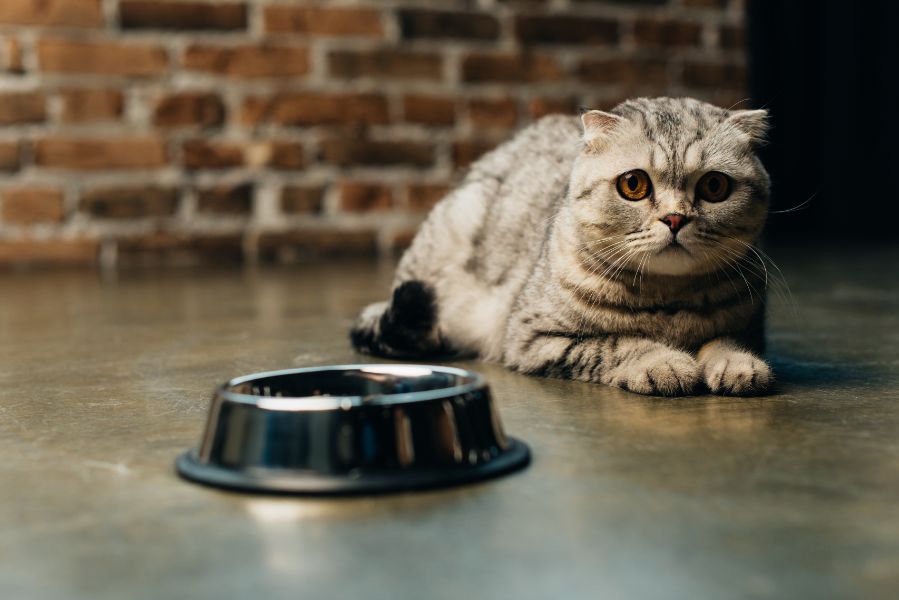Help! My Cat Won’t Eat!

Cat owners typically know when their cat is hungry. Constant meows, chirps, and the circling around your legs are often first clues. Yet, after all that fussing and the meal now in the bowl, it can be surprising and even frustrating when your cat decides not to eat it.
What’s going on when your cat won’t eat? There are several possibilities and they deserve an owner’s attention and action.
Question the Cat Food
It’s not uncommon for cats to suddenly change their food preferences. After happily eating the same food for years, at some point in time, some cats may just simply reject it. Even though the food may look and smell the same to us, cats can be quite sensitive to subtle changes to the flavor, texture, shape, or ingredients in their food.
A good first step is to check the food’s expiration date. Pet foods can become rancid or spoil if past their ‘use by’ date, especially, canned or other ‘wet’ food products. If the food is ok, check with your veterinarian for an alternative food recommendation, as nutritional quality and tasty-ness both need to be considered, and your cat’s health status also plays an important role in the choice.
Once done, if your cat still won’t eat, it’s time for concern. At this point, it may not just be the food, so it’s time for a visit to the veterinarian for a check-up.
What Else Could Be Happening
There are several underlying problems that could cause a cat to lose its appetite:
- Illness – There are many health conditions that affect the gastrointestinal system and cause a loss of appetite. Metabolic conditions, pancreatitis, respiratory disease, bacterial or parasitic infections, food allergies, and foreign body obstruction are some of the most common. Cat’s may also be suffering from dental pain, which can make it difficult for them to chew. If your cat hasn’t eaten anything in 12 hours or more, please call and schedule an appointment, as it’s important to address an appetite problem early on.
- Poisoning – Inappetance can also be caused when a cat ingests something poisonous. You may also see diarrhea or vomiting. If you suspect poisoning, treat it as an emergency and have your cat checked by your veterinarian immediately.
- Change – Cats are very sensitive to any shifts in their routine. If you have changed anything in its environment, moved to a different home, added someone new to the household (another pet, family member or housemate), your cat may react to the change by not eating until it has adjusted.
- Medicine – Take a look at any medication or supplements your cat is taking. Some prescription and over the counter medications can cause stomach upset, affecting your cat’s appetite.
- Whisker Fatigue – A cat’s whiskers can be overly sensitive to the sides of its bowl and if the bowl is too small or too deep, causing the whiskers to touch it, some cats won’t eat out of it.
What Can You Do When Your Cat Won’t Eat?
A well-rounded and balanced diet is key to your cat’s vitality and long term health, so it’s important to stay on top of your cat’s eating habits. Once your cat has been examined and screened for potential illness, we can move toward possible treatments or strategies to boost its appetite.
Depending on what we find out, we may try any of the following:
- Warming the food a little in the microwave or adding warm water can entice a cat to eat by increasing the aroma of the food.
- Change to a prescription diet to address a specific medical condition.
- Make the existing food more interesting by adding a little wet food to the kibble or going from a dry kibble to a wet alternative.
- Add a little extra flavor to the food bowl by adding a little tuna fish water, a low-sodium broth, a cat food gravy or cat food topping.
- Switch to a comparable food from a different manufacturer.
- Limit the amount of snacks or treats you give your cat during the day.
- Stick to set meal times (remember, keeping your cat’s routine is important).
- Encourage more daily exercise/activity (at least 30 minutes every day).
- Add some comfort features to the environment: A fun cat tree, interesting toys, a memory foam or self-heating bed, an additional cat litter box.
- Schedule any needed dental work to alleviate your cat’s oral pain and sensitivity.
Healthy Cat, Happy Cat
It can be distressing when your cat won’t eat, but acting quickly can influence the outcome of whatever is going on. If you have further questions about your cat’s diet or overall health, our staff is here to help you at Lone Tree Veterinary Medical Center.



